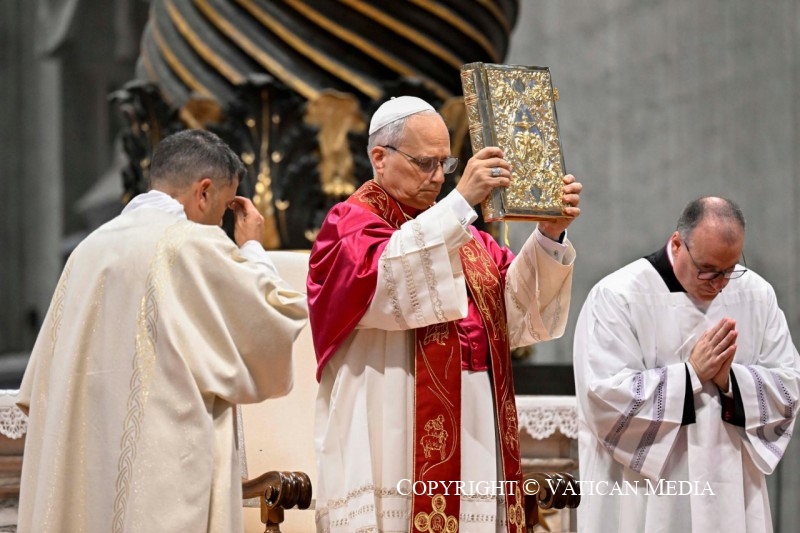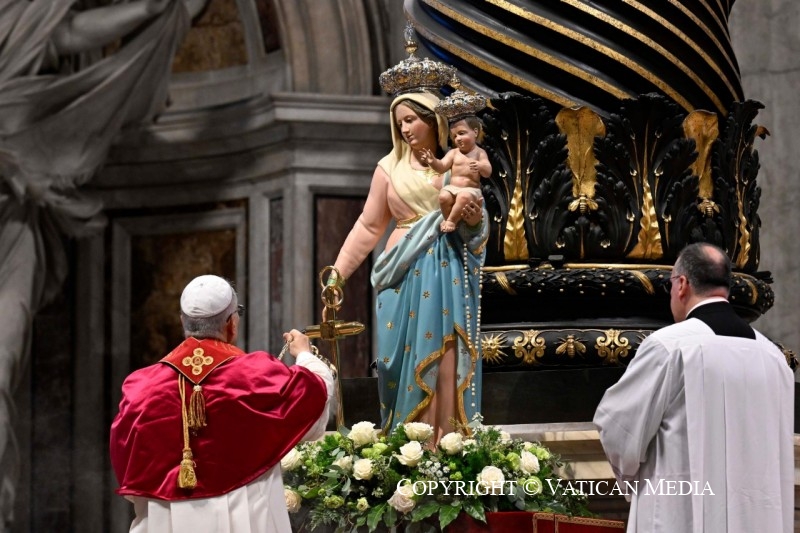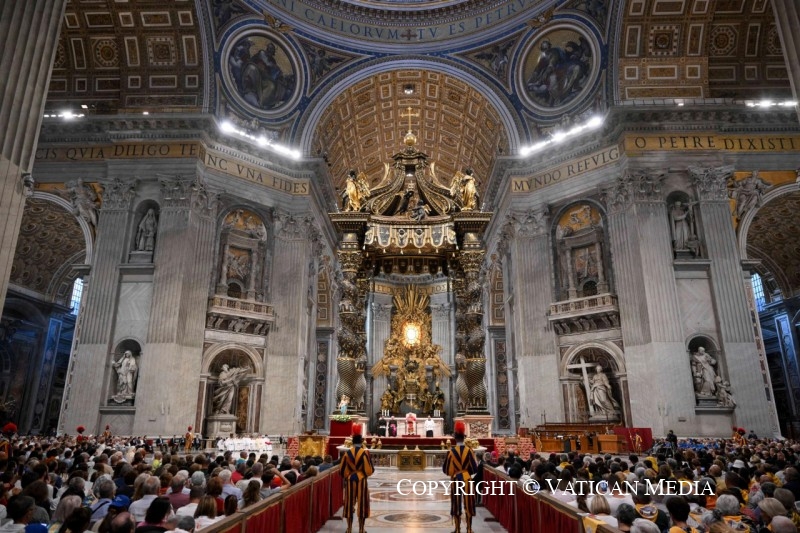“Comfort, O comfort my people” (Is 40:1). This is the appeal voiced by the prophet Isaiah, which continues to resound today, calling us to share God’s consolation with so many brothers and sisters who are experiencing situations of frailty, sadness and pain. For those who are weeping, in despair, in sickness and in mourning, the prophetic announcement of the Lord’s desire to put an end to suffering and turn it into joy resounds loud and clear. In this regard, I would like to thank once again the two individuals who shared their testimonies. We can transform all of our suffering through the grace of Jesus Christ. Thank you! This compassionate Word, made flesh in Christ, is the Good Samaritan spoken of in the Gospel: it is he who soothes our wounds; it is he who takes care of us. In times of darkness, even when all outward appearances suggest otherwise, God does not abandon us. Rather, it is precisely in these moments that we are invited more than ever to place our hope in the closeness of the Savior who never forsakes us.
We seek for someone to console us, and often find no one. At times, we even experience difficulty listening to the voices of those who sincerely wish to share our pain. This happens. There are situations in which words are not helpful and become almost meaningless. In such moments, perhaps only tears remain, but sometimes even these may have run dry. Pope Francis once called to mind the tears of Mary Magdalene, confused and alone before Jesus’ empty tomb. “She simply weeps,” he said. “You see, there are times in our lives when tears are the glasses through which we see Jesus. There is a moment in our lives when only tears prepare us to see Jesus. And what is this woman’s message? ‘I have seen the Lord.’” [1]

Dear sisters and brothers, tears are a language that express the deep feelings of a wounded heart. Tears are a silent cry for compassion and comfort. Moreover, they cleanse and purify our eyes, our feelings, and our thoughts. We should not be ashamed to cry; it is a way of expressing our sadness and our desire for a new world. Crying tells of our humanity, which is weak and tested, but destined for joy.
Where there is pain, the question inevitably arises: why is there so much evil? Where does it come from? Why did it have to happen to me? In his Confessions, Saint Augustine writes: “I searched for the origin of evil… What is its root, and what its seed?… Where then does it come from since the good God made everything good?… Such questions revolved in my unhappy breast… But there was a firm and stable place in my heart for the faith, within the Catholic Church, in your Christ our Lord and Savior, a faith I did not intend to abandon, even though in many respects this faith was still unformed and hesitant” (VII, 5).
Sacred Scripture guides us on the journey from questioning to faith. There are, of course, questions that turn us in on ourselves, divide us internally and separate us from reality. There are thoughts that are not productive. If they isolate us and lead us to despair, they also demean our intelligence. It would be better, as in the Psalms, to turn our questions into pleas, lamentations and supplications for the justice and peace promised us by God. In this way, we build a bridge towards heaven, even when it seems we get no response. In the Church, we seek the open sky, which is Jesus, the bridge between God and man. Consolation is found when faith stands “firm and stable” where it was once “unformed and hesitant” like a boat in a storm.
Where there is evil, we must seek the comfort and consolation that can overcome it and give it no respite. In the Church, this means never being alone. Resting your head on a comforting shoulder, finding someone who cries with you and gives you strength is a medicine that we cannot do without, because it is a sign of love. Where pain is deep, the hope that comes from communion must be even stronger. And this hope does not disappoint.

The testimonies we have heard speak of a truth: that pain must not give rise to violence, and that violence never has the final say, for it is conquered by a love that knows how to forgive. What greater freedom can we hope to achieve than that which comes from forgiveness? By grace, forgiveness has the power to open hearts, regardless of what they have been through. The violence suffered cannot be erased, but forgiveness granted to those who offend us is a foretaste of the Kingdom of God on earth. It is the fruit of God’s work that puts an end to evil and establishes justice. Redemption is mercy, and it can bring us a better future, even while we await the Lord’s return. He alone will wipe away every tear and open to us the book of history, allowing us to read the pages that today escape our understanding (cf. Rev 5).
Also to you, brothers and sisters, who have suffered injustice and violence, Mary repeats her message: “I am your mother.” And the Lord says to you in the depth of your hearts: “You are my son; you are my daughter.” No one can take away this personal gift offered to each of you. The Church, some of whose members have unfortunately hurt you, kneels with you today before our Mother. May we all learn from her to protect the most vulnerable with tenderness! May we learn to listen to your wounds and walk together. May we receive from Our Lady of Sorrows the strength to recognize that life is not defined only by the evil we suffer, but by the love of God, who never abandons us and guides the whole Church.
Furthermore, Saint Paul’s words suggest that when we receive consolation from God, we then become capable of offering consolation to others. He “consoles us in all our affliction,” writes the Apostle, “so that we may be able to console those who are in any affliction with the consolation with which we ourselves are consoled by God” (2 Cor 1:4). God knows the secrets of our hearts; we must not prevent him from comforting us by thinking that we can rely solely on our own strength.

Sisters and brothers, at the end of this vigil, you will receive a small gift: the Agnus Dei. It is a sign that we can take home with us as a reminder of the victory of good over evil: the mystery of Jesus, of his death and resurrection. He is the Lamb who gives us the Holy Spirit, the Comforter who will never leave us. He comforts us in times of need and strengthens us with his grace (cf. Acts 15:31).
Our loved ones who have been separated from us by sister death are not lost and do not fade into the void. Their lives belong to the Lord, the Good Shepherd, who embraces them and holds them close. He will return them to us one day so that, together, we may enjoy eternal happiness.
Dear friends, just as there is personal pain, so too there is the collective pain in our own day. Entire populations are crushed by the weight of violence, hunger and war, and they cry out for peace. This immense cry challenges us to pray, take action to end all violence, and bring peace to those who suffer. Above all, it pleads with God, whose heart trembles with compassion, to bring his Kingdom. The true consolation we must offer to those around us is showing that peace is possible, and that it grows within each of us, if we do not stifle it. May the leaders of nations pay particular attention to the cries of so many innocent children and ensure them a future that protects and consoles them.
Even in the midst of so much arrogance, we are certain that God will inspire hearts and hands to provide help and consolation: peacemakers who can comfort those who are in pain and sadness. Together, as Jesus taught us, we will proclaim with greater conviction: “Thy Kingdom come!”
[1] Francesco, Morning Meditation in the Chapel of the Domus Sanctae Marthae (2 April 2013).
Source: vatican.va





